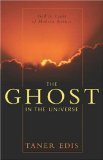 The Ghost in the Universe: God in Light of Modern Science
The Ghost in the Universe: God in Light of Modern Science
by Taner Edis
Prometheus, $29, ISBN 1573929778
Man has always been searching for proof or signs of the existence of a god (or gods). The tools vary from metaphysical philosophy, revelations in holy texts, creationism, intelligent design, the origins of the universe, quantum mysticism, twisting the laws of thermodynamics, faith healing, Gödel’s Theorem, and mystical revelations. Edis tackles them all in this collection of essays and treats all those different ‘proofs’ with respect, pointing out their strong points, and then gently takes them apart. Only the metaphysical philosophers do not get this patient treatment.
Throughout the chapters he describes how the concept of a god has evolved. Miracles were demonstrations of a Higher Power and became breaches of the Natural Law. Bible analysis has caused a change in the concept of a personal God reigning from his throne, to a more vague entity. The 18th Century Enlightment shift from theism to deism was inspired by scientific discoveries.
The more physicists discover, the more the image of a traditional god evaporates and the more the organized religions have problems justifying their claims. If there is no one who observes, cares and meddles, no master plan, then there is not much need for religion any more, nor for a higher power to explain things that a random generator can explain as well. The recurring theme is that our world can best be explained by ‘random accidents’ and that we can very well live with that idea. The answer from the religious, claiming that there is no morality without religion, gets special attention in a chapter on the social animal, sociobiology, evolutionary ethics and evolutionary psychology. Advocates of intelligent design and cosmic design use the same arguments with the same flaws.
The chapter on Holy Writ treats of not only the Bible and the life of Jesus but also quite extensively looks at the Quran and the life of Mohammed. Edis describes how Jahweh evolves from a local thunder and lightning god, who had to compete with the other gods, to a chief of all gods and then to the only god. A Moabite text, in the same style as the Biblical, tells how they “slew the Israelites guided by their own gods” and then committed the same atrocities. The Bible is “not written as an account of the past but an instrument to get unconditional loyalty to Jahweh”.
Traditional miracles are waning and replaced by ‘statistical miracles’. Edis deals with them in a chapter on parapsychology. The ‘new miracles’ are UFO abductions, OBE and NDE. That brings him to neuroscience, the function of the brain, the definition of consciousness, malfunctions of the brain, hallucinations, the mystics and other ways of ‘knowing’, and postmodern philosophy. The battle is to win society and that battle is not waged with scientific arguments. In his conclusions, Edis does not reject religion, instead arguing that we should see it as an art form of myths and magical thinking that can give much pleasure.
A brilliant book, warmly recommended for its broad view, bringing together so many different aspects that are rarely to be found in one great synthesis.

